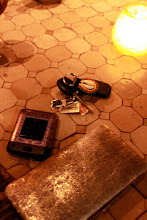Lesson 1:
One of the best things about being a surgeon is that you get to make people listen to your favorite music when you operate, if you're so inclined.
Lesson 2:
One of the worst things about being on your surgery rotation is that you have to listen to your attendings' favorite music while they operate, if they're so inclined. Sometimes you like their music, and you jam out to Chumbawumba and Third Eye Blind and Hootie and the Blowfish behind your mask. Other times it's lots of Nickelback and Lifehouse and really bad Top 40 and you feel like your ears are bleeding.
On a related note, it's funny when middle-aged white surgeons have club music on their playlists.
Lesson 3:
LUNGS ARE HUGE. I'm talking, each lung is like twice the size of my face. On the real. They're all puffy and somehow remind me of two large-ish Teddy bears. I saw live lungs for the first time last night. Crazy thing.
Lesson 4:
Organ transplantation, when successful, is a wonderful thing, giving recipients a new lease on life. What one often doesn't think about is organ donation, which almost always happens when a patient dies. I came face to face with that part of the equation last night during an organ harvest. It was surprisingly disconcerting to see the patient wheeled into the OR, and then to see the patient's vital organs being removed and the patient's life blood being flushed out. All a part of the circle of life, to be sure, and organ donation is a way to make a senseless death worth something more to others. But all these things being true, it's still a difficult thing to stomach, at least at first.
Lesson 5:
I apparently have a tendency to experience dysphagia (ie, difficulty swallowing) and subsequent throwing-up on mornings after I've had very little sleep the previous night. I've had two such nights in my 5 weeks of the surgery rotation so far, and I've thrown up on both of the following mornings. This has happened to me in the past before, too. This can't be good, as I'm sure residency will put me in this very situation many, many times. Must learn to pace oneself in the morning instead of trying to nom after a long night.
Lesson 6:
If you don't watch sports, it might be smart to start doing so in order to interact with a large number of patients during semi-awkward situations. One of my teammates last month could always talk to patients about sports while changing their bandages in order to distract them from the pain. I usually stood mute, especially when the patient was a man and I was pretty sure we had nothing in common. The talking-about-sports route was much better.
Lesson 7:
When asking questions to attendings, be careful not to ask too many questions that reveal your lack of knowledge. Otherwise you might find yourself being told to research your own question and report back to the attending the next morning. Which is what happened to me today when I asked one too many questions about the steps of a kidney transplant. Drat!
Lesson 8:
Sometimes people are just kind of crabby and prone to snapping at you. That's pretty crummy.
Lesson 9:
You know how on Grey's Anatomy, whenever they're doing a transplant they anxiously wait for the organ to "pink up" while thoughtful music wells up in the background? Yeah, that happens in real life, too. I got a bit of a kick out of that.
Lesson 10:
You'd be amazed how quickly a pink bowel turns white when it's not getting blood flow anymore. Conversely, if you look away for a second after a kidney transplant has been attached to the recipient's blood supply, you'll miss the magic moment when it goes from being white to being a rich purplish-pink. Blood flow is cool.

Okay I've already said this on Twitter but I felt I should reiterate. This is an awesome entry! You're such an incredible writer that somehow I don't notice myself becoming comfortable and familiar with something that should be icky to a non-med student... :-)
ReplyDelete